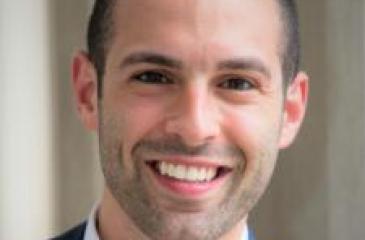CTSI Scholar Brian Sweis, PhD, received the Lindsley Prize in Behavioral Neuroscience from the Society of Neuroscience for his novel translational research on neuroeconomics applied to psychiatric disorders. The Lindsley Prize is awarded each year to one PhD student worldwide with an outstanding thesis in the general area of behavioral neuroscience.
Dr. Sweis focuses his work on the neurobiology of decision-making and addiction and is a current participant in the Medical Scientist Training Program (MSTP), which combines Medical School training and pursuit of a PhD simultaneously.
Bridging academic and translational research
As a final year PhD student, Dr. Sweis sought to transition from mentorship and institutionally-supported research into independent, highly translational research that he could build on in his career as a physician-scientist. The Translational Research Development Program (TRDP), a career development program offered by CTSI’s Research Education, Training, and Career Development Core (CTSI-Ed), was an opportunity recommended to Dr. Sweis by Yoji Shimizu, PhD, former director and founder of the TRDP and current Director of the MSTP.
The TRDP program aims to provide an opportunity for early-stage investigators to gain significant experience with clinical and translational research, and awards funding dedicated to research and project costs over two years.
“Brian’s work is a great example of important dissertation and translational research,” says Jayne Fulkerson, PhD, director of CTSI-Ed’s TRDP and TL1 programs. “This recognition is well-deserved and we are proud to support his cutting edge research.”
Dr. Sweis structured his TRDP research project, “Translational approach to resolve neurobiologically distinct decision-making dysfunctions in addiction,” with a mentorship team consisting of two primary research mentors, Mark Thomas, PhD and David Redish, PhD, and two translational mentors, Sheila Specker, MD, and CTSI-Ed Program Director Kelvin Lim, MD.
This combination of academic support and translational training has been instrumental in supporting Dr. Sweis’s career development in academic and clinical research and practice to benefit human patients struggling with addiction.
“The TRDP provided a physical home, conceptual framework, specialized training environment, and funding source for my research, and is helping me transition into becoming an independent investigator building off of the mentorship I received from my PhD advisors,” says Dr. Sweis. “It’s a bridging mechanism between my past basic science mentors and current clinics mentors transitioning me into my own future of independent translational research.”
Coordinated support
The TRDP also filled an important gap in support during Dr. Sweis’s time in the Medical Scientist Training Program.
“Different funding mechanisms I had received over the years were either directly related to my PhD studies, or didn’t have specific dollar amounts dedicated for my current project with human patients,” Dr. Sweis said. “Some funds were training-based, or covered tuition and stipends, but not the direct costs of the translational clinical project. The TRDP funding covered equipment purchases, human participant recruitment and compensation, and other costs directly related to carrying out this project.”
Dr. Sweis also credits the TRDP as a crucial part of gaining additional funding through the National Institutes of Health (NIH). When applying for the NIH F30 four-year training fellowship, Dr. Sweis specified his intention for the TRDP to bridge PhD work into a translational program, a unique part of his customized and individualized MSTP training plan that would be carried out once back in his final years of medical school after defending his dissertation. Once awarded, the F30 NIH fellowship integrated seamlessly with his TRDP support, covering a stipend, tuition, insurance, and other research costs.
Ongoing clinical practice
As he completes his final year of the MSTP, Dr. Sweis is now carrying out a study for human participants to match the animal research he completed during his PhD. He encourages all MD/PhD students considering joint careers in both clinical practice and academic research to take advantage of the TRDP.
“There’s no reason every MD/PhD student shouldn’t apply for TRDP with a letter of support from their PhD and clinical mentors and intention to apply folded into a unique, robust F30 training plan proposal already encouraged by the MSTP,” says Dr. Sweis.
To learn more about CTSI’s education and career development programs, visit CTSI’s Education and Training page or contact [email protected].
